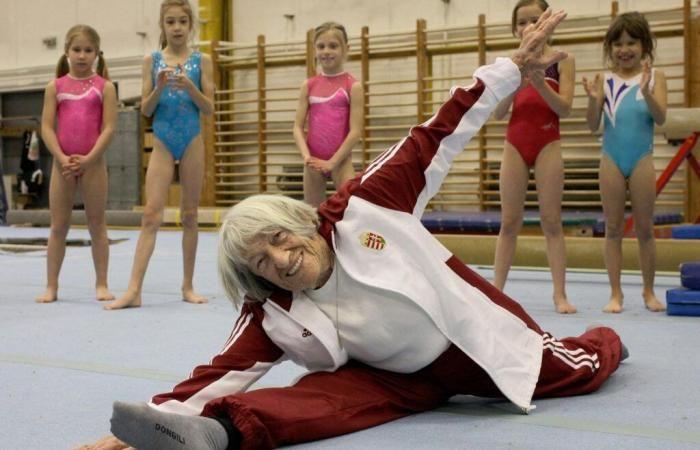
The oldest Olympic champion died on Thursday January 2 at the age of 103, a week before her 104th birthday.e birthday. Born on January 9, 1921 in Budapest, under the birth name of Klein, Hungarian Agnes Keleti not only won ten Olympic medals, including five gold, in gymnastics, but she also demonstrated impressive resilience to overcome the horrors of the 20th century.e century.
“It was worth doing something good in life considering the attention I was getting. I get chills when I see all the articles written about me”she told the Agency – on the occasion of her hundredth birthday.
Agnès Keleti began gymnastics at the age of four and distinguished herself by becoming Hungarian champion for the first time in 1937. But she grew up in the particular context of virulent anti-Semitism. The first European anti-Semitic law was passed in 1920 in Hungary, establishing an academic numerus clausus to limit Jewish access to higher education. His vocation for gymnastics then strengthened.
However, in 1940, when her country joined the Axis armed forces, she was excluded from the national team and banned from playing sports because of her Jewish origins. She changed her name to the Hungarian surname Keleti.
Dazzling at the Melbourne Olympics
In March 1944, while the Nazis invaded her country, she escaped the Shoah by obtaining – in exchange for all her property – “Christian papers” in the name of Piroska Juhasz. Refugee in the countryside, where she works as a servant, the future champion refuses to abandon her passion and trains in secret on the banks of the Danube.
His mother and sister are saved by the Righteous Raoul Wallenberg, a Swedish diplomat. His father was not so lucky: he died during the deportation to Auschwitz. At the start of World War II, 850,000 Jews lived in Hungary. At the end of the war, only 250,000 remained.
At the age of 24 and after the defeat of the Nazis, Agnès Keleti determinedly pursued her Olympic dream. The fate continued since a serious ankle injury during her last training prevented her from participating in the London Games in 1948. In the meantime, the young woman studied physical education. In 1949, she scored a quadruple at the World University Championships held in her hometown.
At the Helsinki Games in 1952, the Hungarian gymnast was already over thirty years old when she finally realized her Olympic ambitions. In Finland, she shone during the floor event, her great specialty, and won three other medals: silver and bronze in teams (multiple and collective exercises with portable apparatus) and bronze on the uneven bars individually .
Bulletin
« Sport »
Surveys, reports, analyses: sports news in your inbox every Saturday
Register
Four years later, at the Melbourne Olympics, she dazzled the Australian public by winning three individual Olympic titles (on floor, beam and uneven bars) and the Olympic team floor title with the Hungarian team. . At age 34, she added two more silver medals, in the individual all-around and the team all-around.
Read also | These participants in the Olympic Games who took the path of exile
Read later
Like around forty other Hungarian athletes, Agnès Keleti took advantage of these Olympic Games, which took place from November 22 to December 8, a few weeks after the failure of the 1956 revolution (October 23-November 10), to not not return to the country. . She spent a few months in Australia before settling in Israel, where she was invited, in 1957, to give a gymnastics demonstration during the Maccabiah, Jewish sporting events organized every four years. In 1959, she married a Hungarian sports teacher, Robert Biro, with whom she had two children. Keleti is considered the founder of gymnastics in Israel.
Frenchman Charles Coste, new dean
After her retirement from sports, Agnès Keleti worked as a physical education teacher and coached the national team for twenty-two years. She only returned to Budapest in 1983, for the gymnastics world championships. In 2000, she was inducted into the Gymnastics Hall of Fame. In the speech given on this occasion, she describes her sport aspoetic burn (“poetic art”). She returned to Budapest permanently in 2015.
Thanks to the 2024 Olympic and Paralympic Games in Paris, France wanted “pay tribute to his eminent merits” and awarded him, in September, the gold medal for youth, sport and community involvement.
“Thank you for everything!” » Hungarian Prime Minister Viktor Orban wrote on Facebook, paying tribute to the champion. Her son, Rafael Biro Keleti, for his part declared that Agnès Keleti had demonstrated, until the end of her life, a “incredible energy”.
According to the country’s main sports daily, Sport nationalit is now the Frenchman Charles Coste (100 years old, born February 8, 1924), gold medalist in the team pursuit in track cycling at the London Games in 1948, and bearer of the flame during the ceremony. opening of Paris 2024, which succeeds Agnès Keleti as the oldest Olympic champion.





